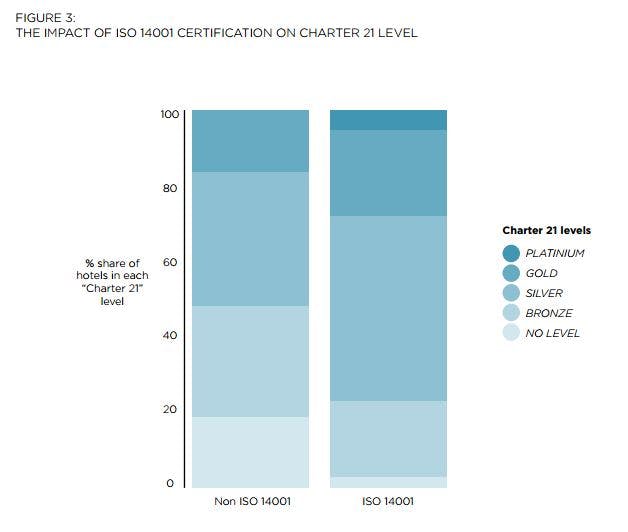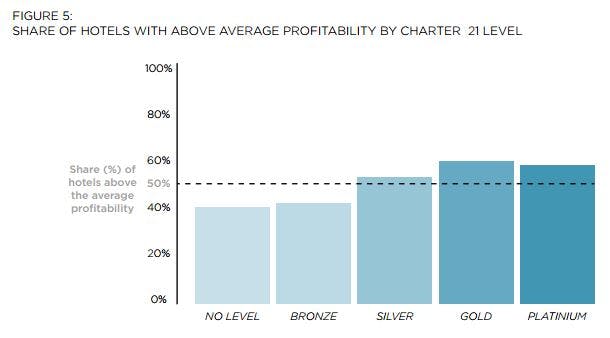If the global tourism sector was a country, it would be the fifth biggest polluter worldwide in terms of greenhouse gas emissions, the United Nations Environment Programme (UNEP) estimates. The industry is responsible for about five per cent of global emissions, 20 per cent of which are from accommodation.
Large hotels are particularly energy-hungry, and with offerings like pools, daily linen changes, and elaborate dining options to maintain, they also consume huge amounts of food and water resources, and generate large quantities of waste.
Stewart Moore, chief executive of Australian green consultancy EarthCheck, notes that if hotels are not legally required to reduce energy and resource use, they may not proactively invest the time and money to operate in a more resource-efficient way. This is because “until now, it has been difficult to fiscally quantify the benefits (of sustainability efforts) over any time period”.
But the good news is that there is a growing body of evidence that proves the business case for implementing sustainability and corporate social responsibility (CSR) practices.
For example, a recent study released in September by Susanne Becken, sustainable development professor at Australia’s Griffith University, finds that tourism businesses which measure resource conservation and participate in EarthCheck’s sustainability certification scheme save tens of thousands of dollars a year.
But the pay-offs from investing in sustainability and CSR measures can go far beyond simple savings due to resource conservation.
As French hoteliers AccorHotels have found, such efforts also help clinch new contracts from corporate clients, retain customer loyalty, and enhance guest comfort.
Arnaud Herrman, vice president of sustainable development, AccorHotels, tells Eco-Business that the company recently commissioned two studies to “validate the common idea” that CSR is not just the responsible way to operate, it is also good for business. The findings of both surveys were released in May this year.
One survey, carried out by Accor and verified by management consultancy EY, examined the links between CSR and business performance. It polled 45 of Accor’s business-to-business (B2B) clients using an online questionnaire to understand how important it was for them that their suppliers had good CSR practices.
The second study was done by market research experts Accenture Strategy, and looked at how CSR affects customer satisfaction. This survey was based on data drawn from 3,518 Accor hotels from 2011 to 2013. These hotels are part of various brands owned by Accor, such as Ibis, Novotel, and Sofitel.
The results of both these surveys are a resounding affirmation of the belief that sustainability is worth the effort for Accor, which says it has been committed to sustainable development for over two decades.
One key finding was that Accor’s CSR credentials helped it to win more business from a client base that is increasingly conscious about corporate responsibility. Almost all the firms polled by Accor said that CSR is important to them, and about three-quarters of them have a responsible purchasing policy.
Half the companies said that CSR would be a deciding factor between two otherwise competitive options, while one-third would terminate a supplier if they were not happy with their CSR performance. These B2B clients contributed some 80.6 million euros of revenue for Accor, out of about 224 million euros generated from total B2B clients.
An additional 11 per cent of clients said that they retain Accor as a “Preferred Partner” due to their good reputation for corporate responsibility.
Accor’s leadership in sustainability and CSR also results in happier, more comfortable guests, the surveys found.
A key element of the chain’s green efforts is ensuring that the environmental management systems in its hotels comply with the International Organization for Standardization (ISO)’s stringent certification, known as ISO 14001.
This standard lays out requirements for the systems that organisations use to manage and monitor sustainability performance. Criteria that companies must fulfil include having an environmental policy which is supported by company leaders, and measuring metrics such as resource use and waste generation.
Today, 40 per cent of all non-budget hotels in the Accor group are ISO 14001 certified.
In the second study, Accenture Strategy found that this ISO 14001 label is not only an internationally recognised stamp of approval, it also helps improve guest satisfaction.
Survey data found that ISO certification had a stronger correlation to customer happiness than how recently the hotel was renovated, implying that it could be more worthwhile for hotels to improve their environmental management systems in order to boost guest comfort than to refurbish their buildings.
Analysis also revealed that when hotels have good environmental management systems, they perform better in Accor’s own sustainability ranking programme, known as Charter 21. This system recommends 65 actions that hotels can take to reduce their environmental footprint and be socially responsible.
“
Staff have the feeling of doing the right thing, and there is a greater sense of pride and motivation. This positive spirit spread to their daily routine, and employees are more committed to their tasks and warmer to guests.
Arnaud Herrman, vice president of sustainable development, AccorHotels
Suggestions include using water-efficient laundry services, energy-saving boilers, and using eco-labelled products in hotels. Based on how many tips they adopt, hotels can earn a Bronze, Silver, Gold, or Platinum rating.
Charter 21 is part of Accor’s main sustainability programme, Planet 21. This initiative outlines measurable targets in areas like carbon emissions, conservation, and health that must be achieved by the end of this year.
On top of this, Accor also undertakes CSR initiatives such as ‘Soap for Hope’, where used soap from hotels is recycled and distributed to low income communities; and ‘Plant for the Planet’, where the chain funds tree-planting activities worldwide. Money for this comes from the savings achieved on laundry bills when guests reuse their towels for more than one night.
None of the hotels surveyed was able to achieve the Charter 21’s top Platinum rank without the ISO 14001-approved systems in place, the survey found.

The impact on ISO 14001 on Charter 21 level. Image: AccorHotels
This is noteworthy because Charter 21 ranking in turn improves customer satisfaction. Accenture Strategy found that the correlation between the number of sustainability recommendations adopted and happy campers was even stronger than that for a hotel’s renovation date and room price.
Herrmann explains that this could be because a commitment to CSR shines through in how employees engage with guests.
Staff “have the feeling of doing the right thing, and there is a greater sense of pride and motivation”, he says. “This positive spirit spread to their daily routine, and employees are more committed to their tasks and warmer to guests.”
Sustainability boosts profits
While these findings show with unexpected definitiveness the value of investing in sustainability and CSR, the most surprising finding is the strong link between the hotel’s profitability and its performance in Accor’s Charter 21 system, says Herrman.
The survey shows that hotels which have not yet achieved a Charter 21 rating or are still at the basic Bronze level are less profitable than average, while Silver, Gold, and Platinum-ranked hotels have higher earnings than the rest.

The link between Charter 21 level and profitability. Image: AccorHotels.
This proves that sustainability performance, as measured by Charter 21, “is clearly correlated to profitability”, says the company.
The findings prove to hotel owners and investors that “by investing in CSR programs they are not only doing good for the planet and for their people but ultimately are having a positive impact on the performance of their hotels and the satisfaction of their guests”, says Herrman.
These surveys have affirmed Accor’s belief that CSR and sustainability are good for business, and will guide Accor even after its Planet 21 action plan expires at the end of this year, he adds.
“If anything, it has inspired the company to integrate even more CSR into the new five-year strategy with targets for 2020”.











